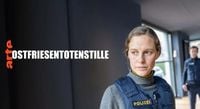The 2025 German thriller "Ostfriesentotenstille" aired on April 25, captivating viewers with a chilling narrative that intertwines domestic violence and vigilante justice. Directed by Katrin Schmidt, this latest installment in the Ostfrieslandkrimi series takes a darker turn, moving away from traditional crime-solving to explore the psychological depths of its characters.
The film opens with a shocking scene: Johann Ricklef, portrayed by Guido Renner, is violently attacked in his home by a masked intruder. The assailant, wearing a devil's mask, threatens Ricklef with a knife and cuts off his finger, delivering an ominous warning to treat his family better. As the masked man quotes Kafka, saying, "'The Metamorphosis' is the story of a transformation. Johann, you can change! Treat your wife like a queen and be a good father to your child!" the psychological implications of the attack begin to unfold.
Despite the brutality of the incident, Ricklef's response is troubling. He later claims to the police that he accidentally severed his own finger while drunk, leaving detectives Ann Kathrin Klaasen (Picco von Groote) and Frank Weller (Tom Radisch) suspicious. Their instincts prove correct as they delve deeper into Ricklef's troubled family life, where signs of domestic violence emerge. Klaasen and Weller are determined to uncover the truth, but Ricklef's fear of the masked man complicates their investigation.
As the story progresses, viewers are introduced to Dr. Bernhard Sommerfeldt, played by Sven Schelker, a seemingly trustworthy doctor in Norddeich. Sommerfeldt's character becomes pivotal when he treats Frithjof, Ricklef's son, who shows signs of abuse. The tension escalates as Sommerfeldt's dark side is revealed—he is the very masked man terrorizing Ricklef. His actions are driven by a twisted sense of justice, leading him to murder those he deems unworthy.
The film's narrative takes a significant turn when Sommerfeldt kills Michael Pelz, an ex-boyfriend of Beate, who is Frithjof's teacher and Sommerfeldt's girlfriend. Pelz had been drugging and filming young women, and Sommerfeldt's violent retribution highlights the film's exploration of justice and morality. This act of vigilante justice raises questions about the effectiveness of the legal system in protecting victims of domestic violence.
As the investigation unfolds, Klaasen and Weller uncover the connections between the murders and the abusive dynamics within Ricklef's family. The film does not shy away from the harsh realities of domestic violence, with Klaasen stating, "Every third day in Germany, a woman is killed by her partner or ex-partner, especially when she tries to leave him or report him. It’s unacceptable." This poignant line underscores the film's critical message about the urgent need for societal change regarding domestic abuse.
In a particularly powerful scene, Weller and Susanne Ricklef, Johann's wife, share an emotional moment at their son’s hospital bedside. Susanne reveals her fears about leaving Johann, stating, "It’s always the talk of people about why I didn’t leave him sooner. Because I was scared that this would happen." This exchange not only humanizes the characters but also sheds light on the psychological barriers victims face when confronting their abusers.
The film's departure from the traditional crime genre into a psychological thriller is notable. Unlike previous installments in the Ostfrieslandkrimi series, which typically involved a classic whodunit format, "Ostfriesentotenstille" opts for a more direct approach. The identity of the masked man is revealed early on, shifting the focus from solving a mystery to preventing further violence.
However, some critics argue that the film's attempt to tackle serious themes becomes muddled in its execution. The initial shock value of the masked killer's actions is compelling, but as the narrative unfolds, it sometimes veers into absurdity. The characterizations, particularly of the masked man and Sommerfeldt, border on caricature, detracting from the film's serious undertones. Critics suggest that the film could have benefited from a more nuanced approach, allowing for a deeper exploration of its themes.
Despite these critiques, the film's cinematography and production values remain high, with a strong visual aesthetic that complements the dark themes. The performances, particularly by Groote and Radisch, are praised for their depth and emotional resonance, grounding the film in a reality that resonates with viewers.
As the film concludes, it leaves audiences grappling with the moral complexities of justice and the societal failures that allow domestic violence to persist. "Ostfriesentotenstille" challenges viewers to reflect on their own perceptions of justice and the responsibilities of society in protecting the vulnerable.
In summary, "Ostfriesentotenstille" is a bold entry in the Ostfrieslandkrimi series, pushing the boundaries of the genre while addressing pressing social issues. While it may not satisfy all traditional crime drama fans, its exploration of domestic violence and the consequences of vigilante justice makes it a thought-provoking watch. The film serves as a reminder of the importance of addressing these critical issues in contemporary society.
For those who missed its initial airing, "Ostfriesentotenstille" will be available for streaming on the Arte-Mediathek and will also be repeated on Arte on May 7, 2025, at 0:25 Uhr.






